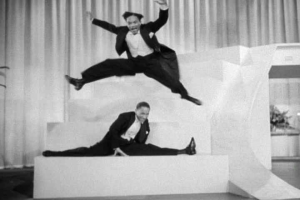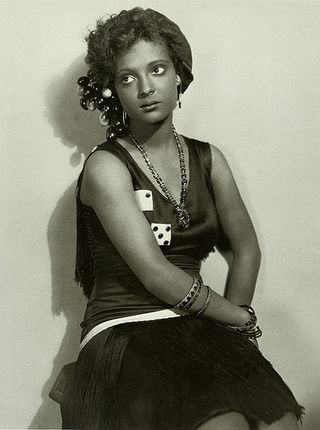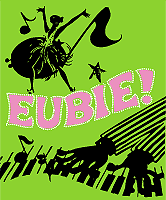Plot summary
| | This section needs expansion. You can help by adding to it. (August 2023) |
| Pie, Pie Blackbird | |
|---|---|
| Directed by | Roy Mack |
| Written by | A. Dorian Otvos |
| Starring | Nina Mae McKinney Nicholas Brothers Eubie Blake Noble Sissle |
| Cinematography | Edwin B. DuPar |
| Music by | Eubie Blake Noble Sissle |
| Distributed by | Warner Bros. |
Release date |
|
Running time | 11 minutes |
| Country | United States |
| Language | English |
Pie, Pie Blackbird is a 1932 Vitaphone pre-Code short comedy film released by Warner Bros. on June 4, 1932, starring African American performers Nina Mae McKinney, the Nicholas Brothers (in their film debut, [1] albeit uncredited), Eubie Blake, and Noble Sissle. [2]
McKinney and the Nicholas Brothere were reunited in another Roy Mack musical short film written by A. Dorian Otvos, The Black Network (1936). [3]
A clip from the film is included in That's Black Entertainment (1989) and the TV special It's Black Entertainment (2002). The full film is available on DVD for Hallelujah! (1929).
| | This section needs expansion. You can help by adding to it. (August 2023) |

James Hubert "Eubie" Blake was an American pianist and composer of ragtime, jazz, and popular music. In 1921, he and his long-time collaborator Noble Sissle wrote Shuffle Along, one of the first Broadway musicals written and directed by African Americans. Blake's compositions included such hits as "Bandana Days", "Charleston Rag", "Love Will Find a Way", "Memories of You" and "I'm Just Wild About Harry". The 1978 Broadway musical Eubie! showcased his works; in 1981, President Ronald Reagan awarded Blake the Presidential Medal of Freedom.

Donald Matthew Redman was an American jazz musician, arranger, bandleader, and composer.

Noble Lee Sissle was an American jazz composer, lyricist, bandleader, singer, and playwright, best known for the Broadway musical Shuffle Along (1921), and its hit song "I'm Just Wild About Harry".

The Nicholas Brothers were an entertainment act composed of brothers, Fayard (1914–2006) and Harold (1921–2000), who excelled in a variety of dance techniques, primarily between the 1930s and 1950s. Best known for their unique interpretation of a highly acrobatic technique known as "flash dancing", they were also considered by many to be the greatest tap dancers of their day, if not all time. Their virtuoso performance in the musical number "Jumpin' Jive" featured in the 1943 movie Stormy Weather has been praised as one of the greatest dance routines ever captured on film.

Harold Lloyd Nicholas was an American dancer specializing in tap. Nicholas was the younger half of the tap-dancing pair the Nicholas Brothers, known as two of the world's greatest dancers. His older brother was Fayard Nicholas. Nicholas was featured in such musicals as An All-Colored Vaudeville Show (1935), Stormy Weather (1943), The Pirate (1948), and The Five Heartbeats (1991).

Shuffle Along is a musical composed by Eubie Blake, with lyrics by Noble Sissle and a book written by the comedy duo Flournoy Miller and Aubrey Lyles. One of the most notable all-Black hit Broadway shows, it was a landmark in African-American musical theater, credited with inspiring the Harlem Renaissance of the 1920s and '30s.

African-American musical theater includes late 19th and early 20th century musical theater productions by African Americans in New York City and Chicago. Actors from troupes such as the Lafayette Players also crossed over into film. The Pekin Theatre in Chicago was a popular and influential venue.

Nina Mae McKinney was an American actress who worked internationally during the 1930s and in the postwar period in theatre, film and television, after beginning her career on Broadway and in Hollywood. Dubbed "The Black Garbo" in Europe because of her striking beauty, McKinney was both one of the first African-American film stars in the United States and one of the first African-Americans to appear on British television.

Hallelujah is a 1929 American pre-Code Metro-Goldwyn-Mayer musical directed by King Vidor, and starring Daniel L. Haynes and Nina Mae McKinney.

Eubie! Is a revue featuring the music of jazz/swing composer Eubie Blake, with lyrics by Noble Sissle, Andy Razaf, Johnny Brandon, F. E. Miller, and Jim Europe. As with most revues, the show features no book, but instead showcases 23 of Eubie Blake's best songs. The idea of the show was conceived by Julianne Boyd. It opened in 1978, receiving positive reviews from Time, Newsweek, Variety, Backstage, and The Today Show.

That's Black Entertainment is a 1989 documentary film starring African-American performers and featuring clips from black films from 1929–1957, narrated and directed by William Greaves. The clips are from the Black Cinema Collection of the Southwest Film/Video Archives at Southern Methodist University in Dallas, Texas. It is 60 minutes long and was distributed by Video Communications of Tulsa, Oklahoma.
The Black Filmmakers Hall of Fame, Inc. (BFHFI), was founded in 1974, in Oakland, California. It supported and promoted black filmmaking, and preserved the contributions by African-American artists both before and behind the camera. It also sponsored advance screenings of films by and about people of African descent and hosted the Oscar Micheaux Awards Ceremony, held each February, from 1974 to 1993, in Oakland.
Flournoy Eakin Miller, sometimes credited as F. E. Miller, was an American entertainer, actor, lyricist, producer and playwright. Between about 1905 and 1932 he formed a popular comic duo, Miller and Lyles, with Aubrey Lyles. Described as "an innovator who advanced black comedy and entertainment significantly," and as "one of the seminal figures in the development of African American musical theater on Broadway", he wrote many successful vaudeville and Broadway shows, including the influential Shuffle Along (1921), as well as working on several all-black movies between the 1930s and 1950s.
Aubrey Lee Lyles, sometimes credited as A. L. Lyles, was an American vaudeville performer, playwright, songwriter, and lyricist. He appeared with Flournoy E. Miller as Miller and Lyles as a popular African-American comedy duo from 1905 until shortly before his death. in 1929 they appeared on film as grocers in the Vitaphone Varieties short comedy film They Know Their Groceries.

"I'm Just Wild About Harry" is a song written in 1921 with lyrics by Noble Sissle and music by Eubie Blake for the Broadway show Shuffle Along.
Roy Mack, born Leroy McClure, was an American director of film shorts, mostly comedy films, with 205 titles to his credit.
Adorjan Dorian Otvos was a writer and composer in Hollywood. He was born in Hungary. He worked on several Broadway productions as well as Vitaphone short films, often as a co-writer.
That's the Spirit is an American short musical film released in 1933. It features an African American cast starring Noble Sissle and was directed by Roy Mack. The Vitaphone film was distributed by Warner Brothers. The film survives.

The Black Network is an American short musical film released in 1936 that was directed by Roy Mack and released through Vitaphone. It is extant.